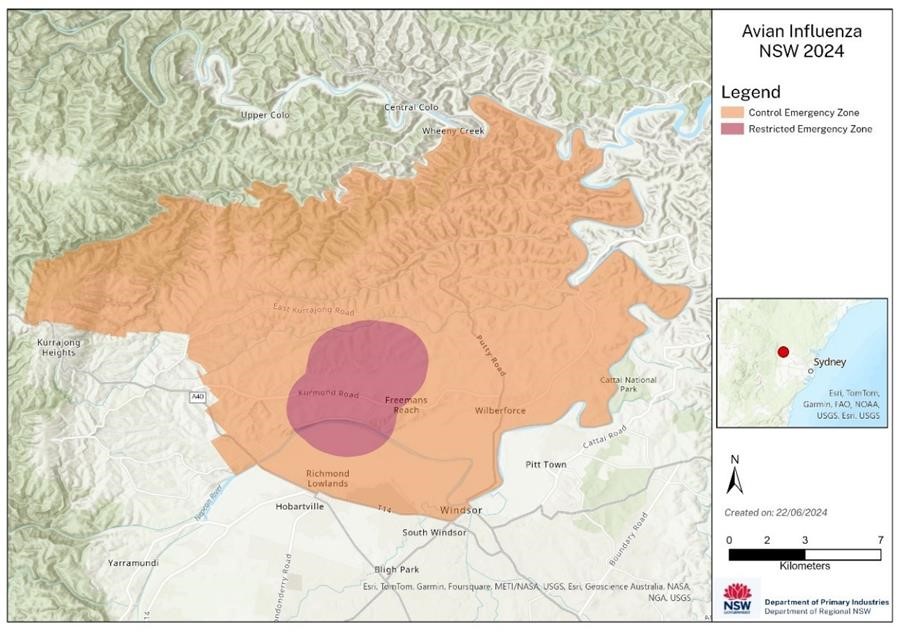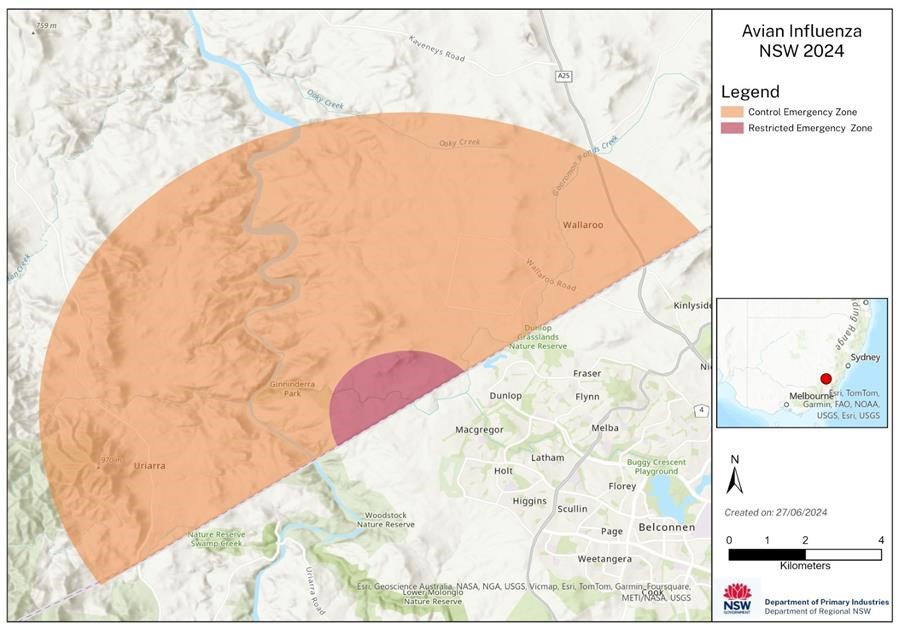Avian Influenza: Emergency order implemented around Canberra dectection
Today an additional emergency zone has been established to cover area in the vicinity of the ACT detection.
A biosecurity emergency order applies to all birds in private care within both the Restricted Emergency Zone and Control Emergency Zones. This includes rescued wild birds.
The movement of any birds within the Restricted Emergency Zone and Control Emergency Zones is a breach of the emergency order.
Has the emergency order changed?
There have been minor administrative changes to the emergency order. Emergency zones have also been established as a result of the case in the ACT. You can find a full version of the Emergency Order here
The below map outlines the area covered by the control zone. You can search your address to see if you are in the control zone here.


What are the requirements of the emergency orders?
The biosecurity emergency order requires:
- Implementation of an AI restricted emergency zone within a two kilometre radius around the NSW detections.
- Implementation of an emergency zone in the NSW region close to the ACT detection
- Movement restrictions of all avian influenza susceptible birds into and out of the restricted and control emergency zones.
- All avian influenza susceptible birds within the control and restricted emergency zones to be housed to prevent contact with wild birds.
The emergency orders will remain in place for a period of six months.
What are the signs and symptoms of avian influenza?
Avian influenza is an infectious disease of birds caused by an influenza virus.
Signs and symptoms include:
- Sudden increase in bird deaths
- Sudden decline in feed and/or water consumption
- Unusually quiet birds
- Dull or depressed birds
- Decreased vocalisation
- Any decline in egg production from normal, or cessation of laying
- Sudden appearance of pale shell eggs or eggs without shells
- Any birds with swollen heads/combs/wattles
- Any birds with dark combs and wattles
- Any birds with nervous signs e.g. head shaking, head and neck tremors, unsteady gait Abnormal position of head and neck in a reasonable % of birds
- Respiratory disease e.g. breathing difficulties, coughing, sneezing
- Purplish patches on the legs and unfeathered skin
- Watery diarrhoea or vomiting
How do I report any unusual signs or symptoms?
Avian influenza is a notifiable disease in NSW. If you notice symptoms consistent with avian influenza, you must report it immediately to the 24-hour Emergency Animal Disease Hotline on 1800 675 888 or the Local Land Services on 1300 795 299 (during business hours).
More information on Avian Influenza can be found on the NSW DPI website.
ACCC Guidance on free range egg and chicken meat claims during avian flu outbreak
The ACCC has provided the following guidance in relation to its position in situations when avian influenza outbreaks have led to urgent housing orders being put in place.
The aim is to provide free range egg and chicken meat producers with regulatory certainty about the ACCC’s enforcement approach when a housing order or producer decision to impose voluntary housing due to avian influenza conflict with the Free Range Labelling Information Standard and the Australian Consumer Law.
The Australian Consumer Law prohibits misleading or deceptive conduct and certain representations which are false or misleading.
In normal circumstances, it would be a breach of the Free Range Labelling Information Standard and the Australian Consumer Law for an egg or chicken meat producer to label their product as free range when it was produced by chickens housed without access to outside areas.
Free range egg producers subject to housing orders
Under the Free Range Labelling Information Standard, free range egg producers may prevent their hens from accessing the outdoor range for a period that is “not unreasonable” in a range of circumstances, including where they are being medicated or otherwise cared for, or in ‘exceptional circumstances’ that pose a significant risk to the hens’ health or safety.
The ACCC is aware that free-range egg and chicken producers may be required under government orders to house their flocks for certain periods, in response to the current avian influenza outbreak.
In these circumstances, the ACCC considers that the avian influenza outbreak resulting in government housing orders will constitute ‘exceptional circumstances’.
Accordingly, free range egg producers who are subject to the ongoing government housing orders will not face enforcement action from the ACCC in relation to their free range labelling claims as a result of their compliance with the orders.
Voluntary housing by free range egg producers in proximity to outbreaks
In addition, the ACCC will not take enforcement action in relation to free range egg claims (on labels or packaging) made by free range egg producers located in areas proximate to restricted areas who voluntarily house their hens for up to two months from the date of the first housing order in their relevant State, while housing orders are in force in the restricted areas.
Free range chicken meat growers
While there is no information standard that applies to free range chicken meat, the ACCC recognises the exceptional circumstances which currently apply.
Accordingly, the ACCC will exercise its discretion and not take enforcement action in relation to free range labelling claims made by free range chicken meat growers in restricted areas as a result of their compliance with housing orders, for the period in which housing orders apply to them.
For free range chicken meat producers who voluntarily house their chickens due to their proximity to restricted areas in which housing orders are in force, the ACCC will exercise its discretion and not take enforcement action in relation to free range labelling claims made by free range chicken meat growers for up to two months from the date of the housing order in their relevant State.
When should free range claims cease to be made?
We strongly encourage all affected producers and retailers who are making free range claims about eggs or chicken meat during this emergency period to consider contingency labelling arrangements if housing orders are for an extended duration, which could include temporary alternative labelling or packaging.
Further, where a free range egg or chicken meat producer is voluntarily housing chickens for more than two months from the date of the first restricted area order in their relevant State, the ACCC would be concerned if the producer is continuing to make free range claims about eggs or chicken meat produced from those chickens.
This is because consumers rely on the accuracy of these claims, and in many cases are prepared to pay a premium for free range products.
Please note that the ACCC’s guidance does not bind or represent the approach that may be taken by other ACL regulators (such as State Fair Trading agencies) or private parties under the Australian Consumer Law.



